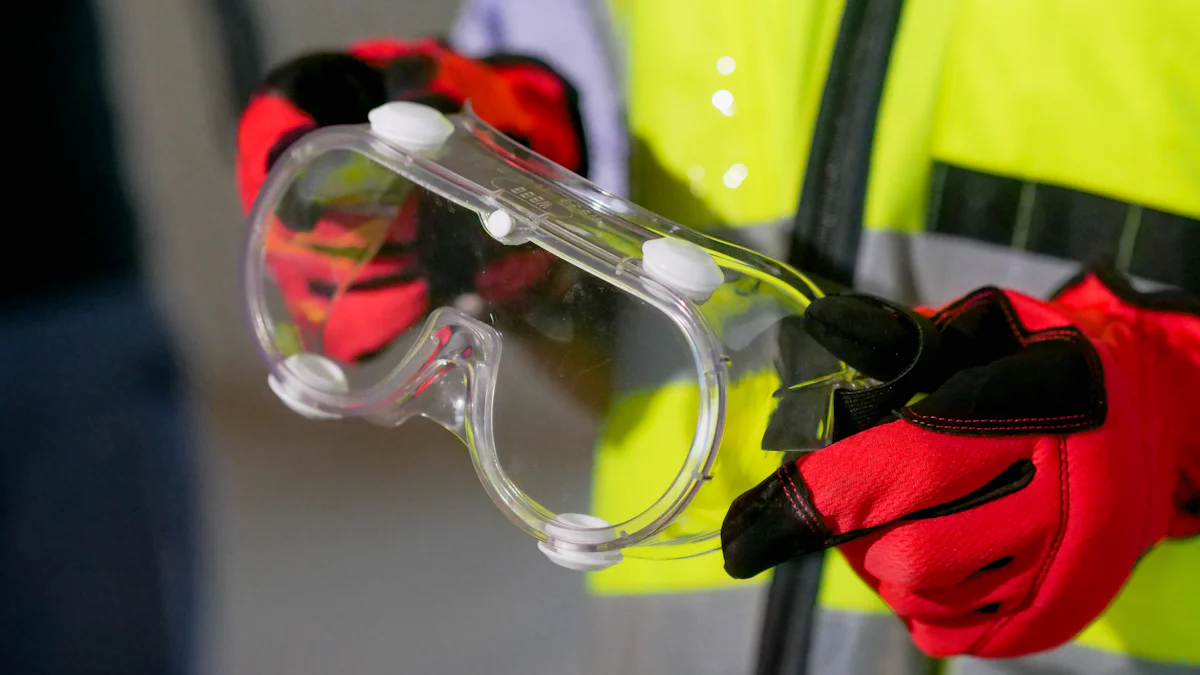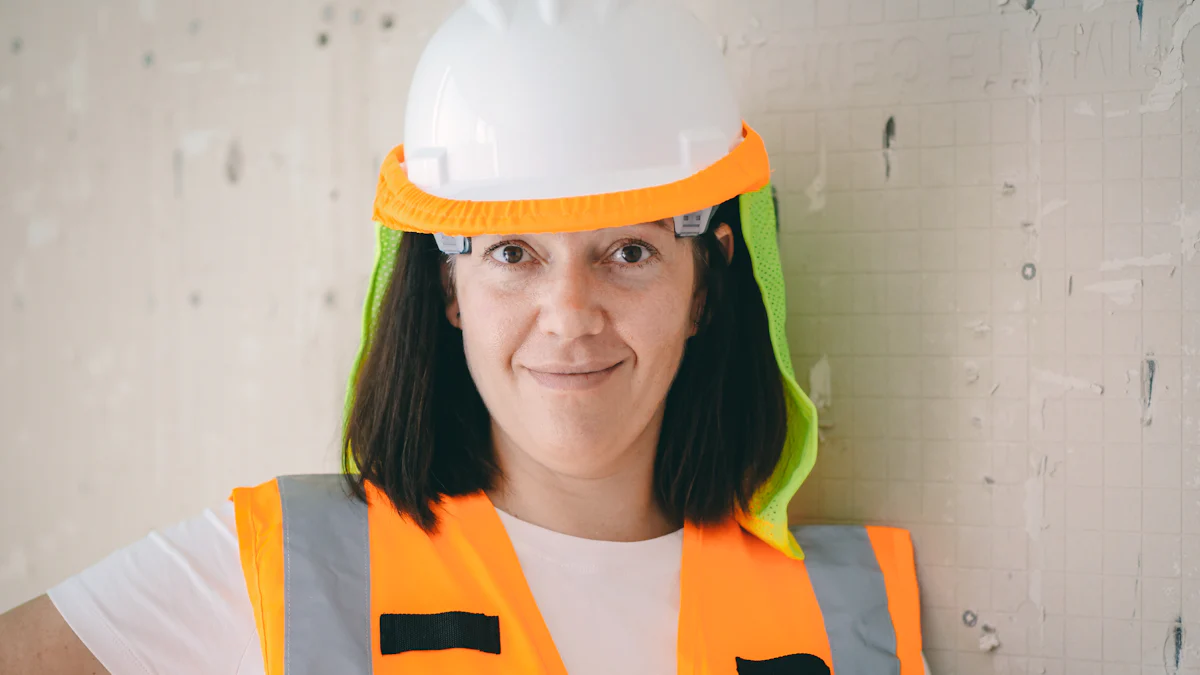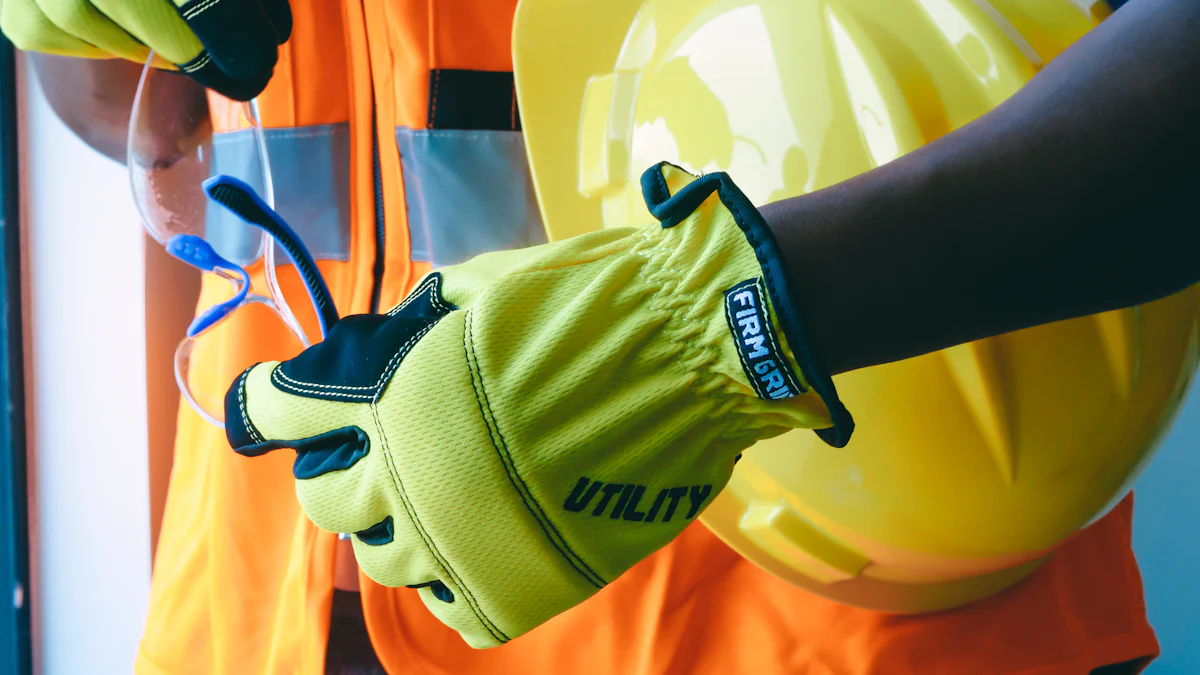
When I think about safety in low-light conditions, reflective strips for clothing stand out as a game-changer. These strips make individuals more visible to others, especially in dim environments. Whether walking at night or working in hazardous areas, they reduce risks by ensuring you remain noticeable. Visibility saves lives, and these strips prove it.
Key Takeaways
- Reflective strips help people be seen in dim light. This keeps them safer on roads or at construction sites.
- Picking the right reflective strips depends on where they are used. Breathable fabrics work best for exercise, while strong ones last in tough places.
- Buying good reflective clothes means they last longer. They also meet safety rules, keeping you safe at work or home.
The Role of Reflective Strips for Clothing in Safety

Enhancing Visibility in Low-Light Conditions
I’ve always found it fascinating how reflective strips for clothing work to make people more visible in dim environments. These strips use retroreflection, which means they bounce light back toward its source. This feature ensures that drivers or machine operators can spot someone wearing reflective clothing, even from a distance. Compared to regular clothing, reflective materials can be up to 20 times more visible in low-light conditions. This level of visibility is crucial for preventing accidents, especially on roads or construction sites. Reflective vests, for example, are designed to maximize visibility from multiple angles, making them effective in both urban and rural settings.
Applications in Workplaces and Outdoor Activities
Reflective strips for clothing play a vital role in various workplaces. I’ve noticed their importance in environments like construction sites, industrial settings, and areas near roadways. Workers in these locations face constant risks, especially during nighttime or early morning hours. Reflective clothing ensures they remain visible to others, reducing the chances of accidents. Beyond workplaces, these strips are also essential for outdoor enthusiasts. Whether hiking, jogging, or cycling at night, wearing reflective gear enhances safety by making individuals more noticeable to vehicles and other people.
Reducing Risks in Hazardous Environments
Hazardous environments demand extra precautions, and reflective strips for clothing provide a simple yet effective solution. I’ve seen how these strips help workers in high-risk areas, such as those handling heavy machinery or working in poorly lit spaces. By reflecting light, they ensure that individuals remain visible, even in challenging conditions. This visibility reduces the likelihood of collisions or other accidents, offering peace of mind to both workers and employers.
Types of Reflective Strips for ClothingGlass Bead Technology and Its Benefits
I’ve always appreciated how glass bead technology makes reflective strips for clothing both effective and affordable. This technology uses tiny glass beads to reflect light back to its source. It’s cost-effective because the manufacturing process is simpler compared to other methods. I’ve noticed that glass bead reflective strips are also highly customizable. They can be easily cut into different shapes or designs using CAD software, which makes them perfect for creating unique safety apparel.
Another advantage is their wide color palette. These strips come in various colors, making them suitable for different industries or personal preferences. What stands out most to me is their ability to reflect light at broader angles. This feature ensures visibility even when the light source isn’t directly in front of the wearer. For example, workers on construction sites benefit from this broad-angle reflection, staying visible to vehicles approaching from different directions.
| Advantage | Description |
|---|---|
| Cost-effectiveness | Glass bead reflective tapes are more affordable due to simpler manufacturing processes. |
| Ease of customization | These tapes can be easily cut using CAD software, allowing for custom designs and graphics. |
| Wide color palette | Glass bead tapes offer the largest variety of colors compared to other reflective films. |
| Broad angle light reflection | They return light at broader angles, providing better visibility in various lighting conditions. |
Microprismatic Technology and Its Advantages
Microprismatic technology takes visibility to the next level. It uses tiny prisms to reflect light more efficiently than glass beads. I’ve seen how this technology ensures maximum visibility, especially over long distances. For instance, microprismatic reflective strips can be seen from over 1,000 feet away, making them ideal for critical applications like highway safety vests or emergency responder gear.
What I find fascinating is how this technology performs in challenging conditions. Whether it’s foggy, rainy, or completely dark, microprismatic strips maintain high visibility. They also reflect most of the light back to its source, which enhances safety for workers or outdoor enthusiasts. Although these strips are more expensive, their durability and superior performance make them worth the investment for high-risk environments.
- Microprismatic technology uses tiny, closely packed prisms to reflect light back to its source.
- It ensures maximum visibility from a distance, even over 1,000 feet.
- Superior light return enhances safety in all conditions, including night, fog, and rain.
- It’s ideal for critical visibility applications like highway safety or emergency response.
Choosing the Right Type for Specific Needs
Choosing the right reflective strips for clothing depends on several factors. I always consider the activity type and environment first. For example, breathable fabrics are essential for physical activities like jogging or cycling. They help regulate body temperature and keep you comfortable. Durability is another key factor. High-quality materials with reinforced stitching work best for frequent use or harsh conditions.
Cost also plays a role. Glass bead strips are more budget-friendly, making them suitable for general use. On the other hand, microprismatic strips offer better reflectivity and durability, which are crucial for high-risk jobs. By understanding these factors, I’ve been able to select the right reflective strips for my needs, balancing safety, comfort, and cost.
- Reflective strips are essential for visibility, utilizing retroreflective material to bounce light back to its source.
- Breathable fabrics improve comfort during physical activities.
- Durability ensures long-term use, especially in harsh environments.
Benefits of Reflective Strips for ClothingImproved Visibility and Accident Prevention
I’ve always believed that visibility is the cornerstone of safety. Reflective strips for clothing significantly improve how easily someone can be seen, especially in low-light or high-risk environments. These strips reflect light directly back to its source, making the wearer stand out to drivers, machine operators, or others nearby. I’ve noticed how this simple feature can prevent accidents, particularly on busy roads or construction sites. For example, joggers wearing reflective gear at night are far less likely to be overlooked by passing vehicles. The same applies to workers near heavy machinery, where visibility can mean the difference between safety and danger.
Compliance with Safety Standards
Reflective strips for clothing also help meet safety standards across various industries. I’ve learned that organizations like OSHA require workers in specific fields to wear high-visibility apparel. Construction workers, for instance, need reflective vests or jackets to stay visible to drivers and equipment operators. Emergency responders, such as firefighters or EMTs, rely on reflective clothing to stand out in chaotic situations. In transportation, workers handling airport ground operations or railway maintenance must wear reflective gear to ensure they remain visible in fast-paced environments. These standards not only protect workers but also create a safer environment for everyone involved.
Durability and Long-Term Use
Durability is another key benefit of reflective strips for clothing. I’ve seen how high-quality reflective materials withstand harsh conditions, including rain, heat, and frequent washing. This durability ensures that the strips maintain their reflective properties over time, making them a cost-effective choice for long-term use. For example, microprismatic strips, known for their robust design, perform well even in extreme weather. Investing in durable reflective clothing means fewer replacements and consistent safety, which I find essential for both personal and professional use.
Choosing the Right Safety Apparel with Reflective Strips

Factors to Consider: Activity Type and Environment
When choosing safety apparel, I always start by considering the activity and environment. Different activities require specific features. For example, running or cycling demands lightweight and breathable clothing to ensure comfort and freedom of movement. On the other hand, work environments like construction sites or industrial areas need durable apparel that can withstand harsh conditions. Reflective strips for clothing play a vital role in these scenarios by enhancing visibility in low-light or high-risk settings. I’ve found that breathable fabrics help regulate body temperature during physical activities, while reinforced stitching ensures durability for frequent use.
Balancing Comfort and Functionality
Comfort and functionality should go hand in hand when selecting safety apparel. I’ve learned that breathable materials make a significant difference, especially during long hours of wear. However, comfort should not compromise safety. Reflective strips must be strategically placed to maximize visibility. For instance, vests with reflective strips on the chest, back, and shoulders provide 360-degree visibility. I also avoid common mistakes like washing reflective clothing with rough items or using bleach, as these can damage the reflective material and reduce its effectiveness.
Evaluating Quality and Certification
Quality and certification are non-negotiable for me when it comes to safety apparel. High-quality materials ensure durability and long-term use. I always check for certifications that meet industry standards, such as ANSI or EN ISO, to guarantee the apparel’s effectiveness. Certified reflective strips maintain their reflective properties even after exposure to rain, heat, or frequent washing. By prioritizing certified products, I feel confident that I’m investing in reliable safety gear.
Reflective strips for clothing play a vital role in ensuring safety. They enhance visibility and reduce risks in various scenarios. I’ve learned that understanding their types and benefits helps in making informed choices. Prioritizing high-quality reflective apparel ensures better protection and compliance with safety standards, which I always recommend for peace of mind.
FAQ
What makes reflective strips effective for safety?
Reflective strips use retroreflection to bounce light back to its source. This makes wearers highly visible in low-light conditions, reducing risks in hazardous environments.
Can reflective strips withstand harsh weather?
Yes, high-quality reflective strips handle rain, heat, and frequent washing. I’ve seen durable options like microprismatic strips maintain their performance even in extreme conditions.
How do I maintain reflective clothing?
Avoid washing reflective clothing with rough items or bleach. Use mild detergents and air-dry to preserve the reflective material’s effectiveness over time.
Media Contact
Company Name: NINGBO TRAMIGO INTERNATIONAL TRADING CO., LTD.
Email:Send Email
Phone: +86 13336665253
Country: China
Website: https://www.tramigosourcing.com/
